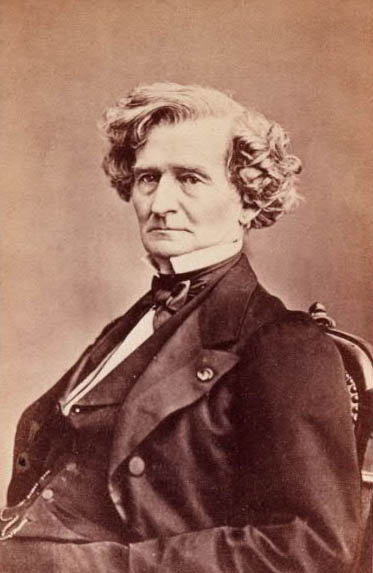 |
| Hector Berlioz (1803-1869) |
'I am still unknown. But when I have written an immense instrumental composition which I am now meditating, I intend to go to London to have it performed. Let me win a brilliant success under her very eyes!'
The instrumental composition was to become his first symphony, called the Symphonie fantastique. I have studied the work for the last two weeks and focused intensely on the orchestration, which was by then unconventional and revolutionary. I want to give a breakdown of some of my findings, which will hopefully provide another perspective on how to appreciate Berlioz' arguably most popular work even more.
I - Rêveries - Passions
At rehearsal letter R1 (near the end of the movement) Berlioz gives the instruction: Tout l'orchestre aussi doux que possible, which means that the whole orchestra should play as soft as possible (the instruments are marked ppp). This can be heard at 14:20 in the video below
II - Un Bal
At bar 118, he instructs the violins to play presque rien - almost nothing (17:30)
III - Scène aux Champs
At the beginning of this movement Berlioz wants the first oboe derrière la scene to be played behind the stage, to further establish the distant answer call to the english horn. You can see the player has left his usual position in the video (22:30).
The other interesting device he used for this movement is his use of four timpani to mimic an oncoming thunderstorm. The players can be seen at 35:33.
IV - Marche au Supplice
At rehearsal mark M, Berlioz is very particular that the bass drum and cymbal should carefully observe their alternating dynamics of ff and mf (41:05).
V - Songe d'une Nuit du Sabbat
At the beginning of the final movement Berlioz sub-divides the violins and violas into 2 and 3 sections, and instructs them to play con sord. a punta d'arco - muted and only with the tip of the bow, to give a shimmer for the cellos and basses (42:48).
A nice little effect occurs at rehearsal letter A, when the piccolo, flute and oboe are instructed to perform a glissando on their instruments (43:20).
Next, Berlioz introduces orchestral bells, which are realised with steel plates in the video reference (45:50). He did remark that when the orchestra has no bells at its disposal, two pianos could be used as a substitute.
The bells are foretelling the DIES IRAE, which is a catholic chant often associated with death or suffering (46:14).
The last in a series of delightful orchestral effects occurs at rehearsal mark M1 with the strings playing frappez avec le bois de l'archet. I won't give the translation here as one must experience the effect without knowing what is happening, to fully appreciate its existence in this context (51:16)!
-PW

